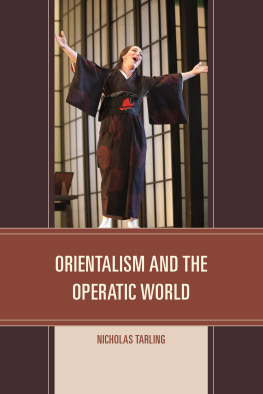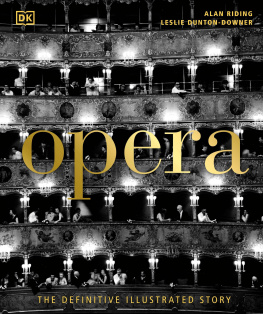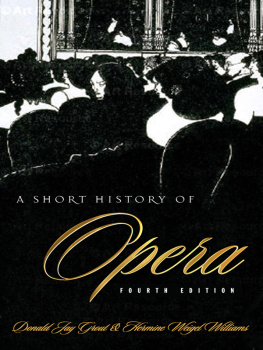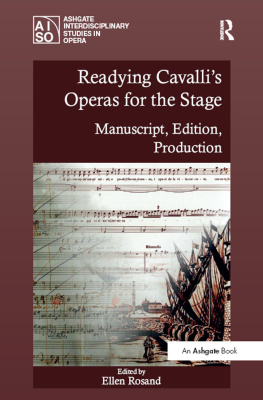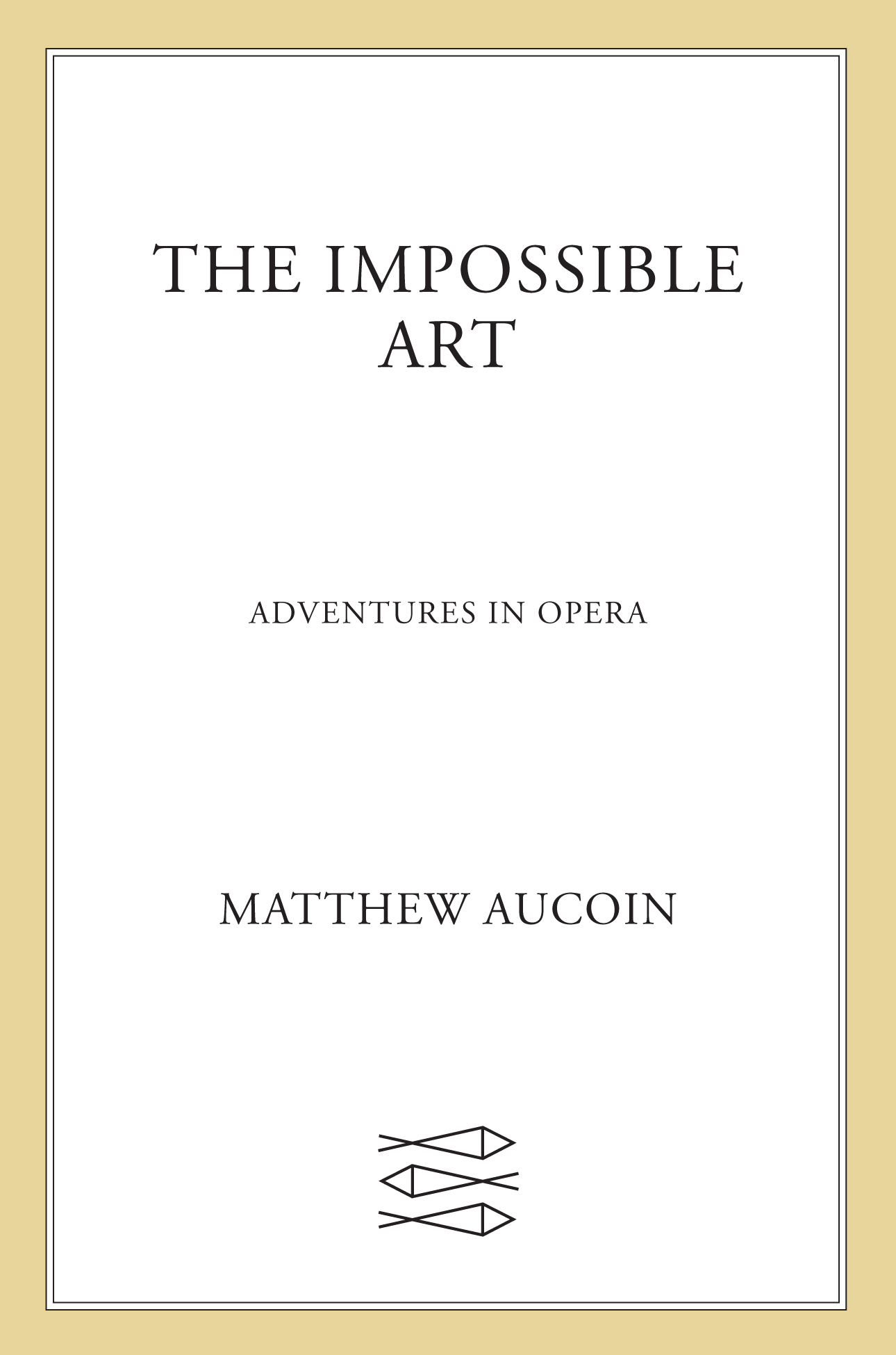Contents
Guide
Pagebreaks of the print version
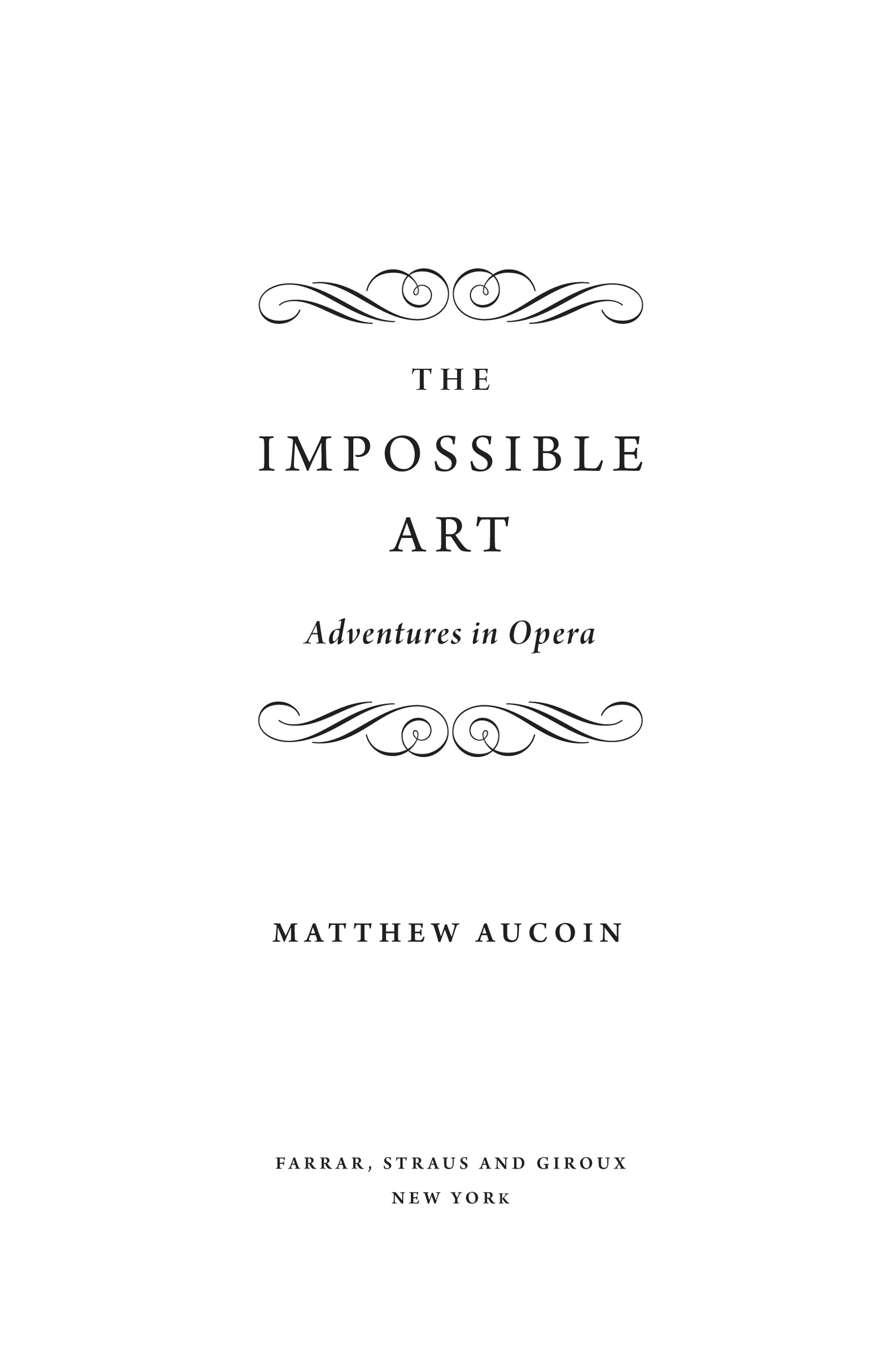
The author and publisher have provided this e-book to you for your personal use only. You may not make this e-book publicly available in any way. Copyright infringement is against the law. If you believe the copy of this e-book you are reading infringes on the authors copyright, please notify the publisher at: us.macmillanusa.com/piracy.
This book is for my family: my parents, Carol and Don, who taught me to read and to listen,
and my sister, Christine, who doesnt like opera, but who makes an exception for Mozart.
Opera is impossible and always has been. Impossibility is baked into the art forms foundations. The operatic ideal, an imagined union of all the human senses and all art formsmusic, drama, dance, poetry, paintingis itself an impossibility. But this impossibility is productive and even liberating: all of operas bizarre and beautiful fruits, its cathartic embodiments of the extremes of human psychology, its carnivalesque excesses, its improbable moments of intimate revelation, stem from artists ongoing search for this permanently elusive alchemy. The art forms first practitioners, in seventeenth-century Italy, strove to re-create the effect of ancient Greek drama, which of course they had never heard, and which no one can be sure was sung in the first place. Nearly four centuries later, Karlheinz Stockhausen wrote a twenty-nine-hour operatic cycle titled Licht (Light), which he called an eternal spiral with neither a beginning nor an end.
These are not merely ambitious endeavors. They are impossible ones. And this impossibility, this perpetual sense that the real thing is just out of reach, is operas lifeblood. If its essence werent unrealizable, the art form wouldnt exist at all.
But never in living memory has opera felt impossible in the way it does now.
Im writing this from the farmhouse where I live with my husband, Clay, in southern Vermont. We are deep into the barren doldrums of the winter of 202021. A foot of snow fell here the other night, heightening the sense that the world is stuck in an eerie, enforced hibernation. The composer in me feels lucky to live in a place where such stillness is possible: on the country roads where I go for my daily run, Im as likely to encounter a herd of deer as another human being. But I have also never felt so distant from live music, from the nourishing symbiosis of performing and appreciating the performances of others. Around here, I couldnt tell you where the nearestno doubt shutteredmusic venue is, even a coffee shop with an open-mic night, never mind a concert hall or an opera house.
A year ago, I was relishing the sublime desert clarity of winter in Southern California as I conducted the world premiere of my opera Eurydice at the Los Angeles Opera. I wrote Eurydice in collaboration with the playwright Sarah Ruhl between 2016 and 2019, and the LA production was the long-awaited first chance to bring our efforts to life; as of this writing, the opera is also slated for production at New Yorks Metropolitan Opera in the fall of 2021. I was proud of every note of EurydiceI wouldnt have said that of my previous operasand throughout the two months I spent in LA, I woke up every day eager to share it with as many people as possible.
Eurydices first production was not entirely free of behind-the-scenes drama: practically every member of our stellar cast fell mysteriously ill at some point during the process, and as a result, nearly every performance was preceded by hours of nail-biting about whether this or that principal singer would feel well enough to take the stage. Danielle de Niese, our star soprano, suffered from a persistent cough; Barry Banks, our stratospherically agile principal tenor, had a bad bout of laryngitis; and Rod Gilfry, a veteran baritone whos usually sturdy and imperturbable as a redwood, was plagued by a cold that lingered for weeks. Nobody thought much of it at the time. Opera singers are notoriously prone to colds and the flu, and since their careers depend on the faultless functioning of two temperamental bands of muscle tissue within the larynx, they can be forgiven for their hypersensitivity (even if it does, at times, verge on hypochondria). Though this barrage of inexplicable maladies was stressful, it didnt feel so far outside the norm for a midwinter production of a grand opera. And hey, we made it through every performance, even if it was by the skin of our teeth.
But from my current vantage pointthe snowbound, black-and-white hush of the Green Mountainsthe whole experience of Eurydices first production seems like a dream that I keep mixing up with reality, a memory from a past life or parallel universe. It doesnt quite compute that throughout February 2020, even as news of a newly discovered, rapidly spreading coronavirus grew bleaker by the day, audiences of nearly three thousand people continued to gather night after night in the auditorium of the Dorothy Chandler Pavilion for the singular communion that is live opera. In the pit, the orchestra and I crammed together to form one sweaty, subliminal sound machine. Onstage, the soloists sang in each others faces with spittle-spraying vehemence. The audience coughed cheerfully and continuously, as opera audiences do. The cast and I hugged at our curtain calls, and celebrated afterward at crowded bars. Now, after eleven months in a sepia-tone quarantine, every aspect of the Eurydice experience seems as fantastical, in its Technicolor vividness, as a memory of Oz.
After our last performance, I flew home to New York, where Clay and I shared an apartment with our friend, the director Zack Winokur. The virus was on everyones mind, but in Trumps America, it was hardly the only potential source of anxiety in our polluted informational ether, and the threat still felt pretty remote.
A couple of weeks later, however, the distant alarm bells got louder, and the halfhearted precautions wed all been followingthe elbow bumps, dont touch your face, and so onsuddenly seemed hilariously ineffective. Abstract unease curdled overnight into panic, and the world creaked to an unpracticed halt. In such a moment, performing artists were anything but essential, as nurses and grocery store workers were; we were, instead, suddenly a public health liability. Im sure I was far from the only musician who detected the metallic whiff of some unknown anesthetic being released into the air. Our whole field was being lowered into a medically induced coma.
Even before the onset of the COVID-19 pandemic, I wanted to write a book celebrating operas generative impossibilities. But I wasnt sure when, if ever, Id manage to step off the merry-go-round of musical workcomposing, performing, travelinglong enough to gather my thoughts. When the pandemic took hold, eighteen months worth of performances evaporated from my calendar, and in-progress commissions were pushed back a year or more.
Though this exile from my usual practice was (and remains) intensely dispiriting, I realized it also afforded me a window like none other in my lifetime to write down why I love this maddening, outlandish, impossible art form, and what I think its capable of at its best. To borrow the title of a great opera by Kaija Saariaho and Amin Maalouf, this book is full of lamour de loinlove from afar.
Theres something to be said for distance, for loving from afar: theres a reason that Jaufr, Saariahos troubadour protagonist, perfects the art of longing only when hes worlds away from his imagined beloved, Clmence. (When Jaufr makes the mistake of trying to visit Clmence, he dies. Some love affairs, like some art forms, are meant to remain impossible.) In the same vein, if I may channel Jaufrs idealism, I think theres a strong argument to be made for getting to know opera from afar, in a setting other than the opera house.


